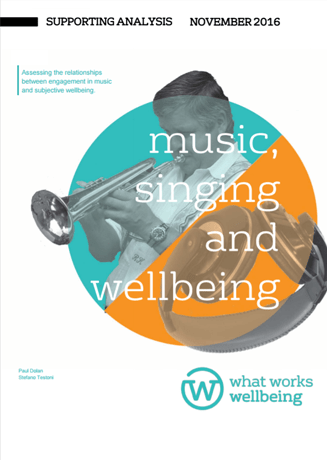Music, singing and wellbeing in healthy adults summary insights
Downloads

Intro
What music and singing interventions work to improve wellbeing of healthy adults? This briefing looks at all the available evidence to support better policy.
What are the key findings?
Below is the evidence of impact on different populations that participated in group singing, listening to music and structured music interventions. Further evidence, with standardised reporting, could help us understand the characteristics of the most successful projects.
Structured music and singing activities have wellbeing benefits for particular groups
Where you see the following symbols it indicates:
-
qualitative
-
quantitative
-
strongWe can be confident that the evidence can be used to inform decisions.
-
promisingWe have moderate confidence. Decision makers may wish to incorporate further information to inform decisions.
-
initialWe have low confidence. Decision makers may wish to incorporate further information to inform decisions.
Music and singing projects for young offenders are valued by participants and have a positive effect on self-esteem. Participatory music making, singing and particularly performing in public, can support prison inmates’ perceived wellbeing.
Structured music therapy can reduce the intensity of stress, anxiety and depression in pregnant women
Group singing has wellbeing benefits, with a lot of evidence available for older adults
Where you see the following symbols it indicates:
-
qualitative
-
quantitative
-
strongWe can be confident that the evidence can be used to inform decisions.
-
promisingWe have moderate confidence. Decision makers may wish to incorporate further information to inform decisions.
-
initialWe have low confidence. Decision makers may wish to incorporate further information to inform decisions.
Regular group singing can enhance morale and mental health-related quality of life and reduce loneliness, anxiety and depression in older people compared with usual activities.
Participatory singing can maintain a sense of wellbeing and is perceived as both acceptable and beneficial for older participants.
Singing can maintain a sense of wellbeing in healthy older people.
Group singing can foster happiness as well as provide musical and social benefits.
Being a member of a music ensemble can enhance subjective wellbeing, support the development of musical identity and a sense of purpose.
Brief group singing can enhance perceived psychological wellbeing.
Wellbeing benefits from group singing can relate to connecting in a community and finding identity and expression.
Where you see the following symbols it indicates:
-
qualitative
-
quantitative
-
strongWe can be confident that the evidence can be used to inform decisions.
-
promisingWe have moderate confidence. Decision makers may wish to incorporate further information to inform decisions.
-
initialWe have low confidence. Decision makers may wish to incorporate further information to inform decisions.
Engagement in music activities can help older people to connect with their life experiences with other people, and be more stimulated.
Older adults are motivated to participate in musical activities to broaden their social networks and to learn. (initial evidence)
Participants from marginalised groups value the benefits of group singing and the opportunity to learn, build relationships and engage in a meaningful exchange with the wider community.
Active music making in community choirs and music ensembles may be an effective way to support individuals from marginal communities, enabling them to build a sense of community and share culture and heritage. (initial evidence)
Membership of a choir or musical ensemble can provide a vehicle for identity construction and revision in later life, including people with little or no previous experience of music.
Performing and sharing their songs with others can be significant and meaningful to participants. Music can help older people to develop self-identity, or connect with other people, expressing spirituality and reminisce.
Song-writing and performing can contribute to happiness in older people. Performing and sharing their songs with others can be significant and meaningful to them.
Learning music may help older adults to realise longheld ambitions and promote spiritual growth. (initial evidence)
Listening to music in itself has wellbeing benefits.
Where you see the following symbols it indicates:
-
qualitative
-
quantitative
-
strongWe can be confident that the evidence can be used to inform decisions.
-
promisingWe have moderate confidence. Decision makers may wish to incorporate further information to inform decisions.
-
initialWe have low confidence. Decision makers may wish to incorporate further information to inform decisions.
Listening to music may act as an effective intervention to prevent or reduce depression in older people.
Listening to music can alleviate anxiety and improve
wellbeing in young adults. (strong evidence)
Short duration listening to music can enhance mood in young adults.
Listening to music during exercise may enhance the positive effects of physical activity on state anxiety in young adults.
Regular listening to particular genre of music can alleviate anxiety, stress and depression in males.
How can we turn this evidence into action?
Music and singing activities can enhance and maintain subjective wellbeing in healthy adults. Wellbeing is important as a goal in itself, for people to feel satisfied with their lives and experience. However, higher levels of wellbeing have also been associated with better health, work performance and social contribution.
Commonly identified priorities for local authorities
- Social Isolation and impact on mental health and wider aspects of people’s health.
- Mobilising communities and providing opportunities to improve wellbeing.
- Enhancing and maintaining wellbeing in communities, at home and work.
- Supporting maternal wellbeing and reducing anxiety.
Supporting marginalised groups. - Wider health and wellbeing outcomes, in work and in the community.
There is a strong case for local authorities, trusts and foundations to continue supporting of music and singing activities which enhance and maintain subjective wellbeing in adults.
There is a particularly strong case to support participatory music and singing programmes which can help to maintain wellbeing and prevent isolation, depression and mental ill
health in older adult age groups.
Listening to music has been shown to alleviate anxiety in young adults, who have to date been relatively neglected in debates and programme development around music, arts and wellbeing.
Strong evidence supports using structured music therapy to reduce the intensity of stress, anxiety and depression for males.
There is promising evidence that music sessions can alleviate anxiety in young adults and young offenders, and reduce the intensity of stress, anxiety and depression for pregnant women and males.
Local authorities, trusts and foundations can continue to explore these options, to make sure we understand what works.
Trusts and foundations, or any organisation funding music and singing projects, can play an important role in developing the evidence base.
This can be done by supporting and evaluating activities where there is initial evidence (for example, projects for young offenders or marginalised groups) to better
understand the impact.
But what works best? How does this compare to other activities? We still need to find out more.
What type of music and singing intervention is most effective, in which format, for which group – and why? How can these be designed to have the greatest impact? How long do the impacts last for? How does a singing intervention compare to other group activities?
Funders play an essential role in answering these questions, by supporting projects to evaluate what matters, using standardised frameworks.
The what works centre for wellbeing are developing a set of tools for practitioners and community groups.
The evidence teams are reviewing the evidence on cost effectiveness over the coming months, to help groups and funders compare across activities and provide an idea where money may best be spent.
Explore more
This briefing is part of a suite of publications looking at the impacts of music and singing interventions on different populations.
![]()
[gravityform id=1 title=true description=true ajax=true tabindex=49]






